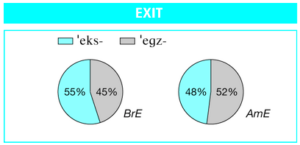Breksit, Bregzit
 There can’t be many words which have gone from non-existence to omnipresence as quickly as Brexit.
There can’t be many words which have gone from non-existence to omnipresence as quickly as Brexit.
People are divided not only on how they feel about Britain’s departure from the EU, but also on how they pronounce this word. Brits generally pronounce the x as /ks/:
but many Americans pronounce it /gz/:
This difference reflects the two pronunciations of the word exit (both noun and verb) which predominate on either side of the Atlantic. We can see the difference in a preference poll which John Wells took some years back for his Longman Pronunciation Dictionary: It’s my impression that the UK-US divergence has if anything become more marked. Certainly we can find American dictionaries which prioritize /gz/, eg Merriam-Webster:
It’s my impression that the UK-US divergence has if anything become more marked. Certainly we can find American dictionaries which prioritize /gz/, eg Merriam-Webster: and British dictionaries which list only /ks/, eg Macmillan:
and British dictionaries which list only /ks/, eg Macmillan:![]() Here anyway are some Brits with /ks/:
Here anyway are some Brits with /ks/:
and some Americans with /gz/:
The /ks/ pronunciation is consistent with a generalization in English regarding ex- and stress: if the e is more strongly stressed than the following vowel we get /ks/, if the reverse we get /gz/. Common examples of /ks/ after stress are:
é/ks/ercise, dyslé/ks/ia, flé/ks/ible, hé/ks/agon, lé/ks/icon, sé/ks/y, É/ks/eter, Mé/ks/ico, Té/ks/as
And examples of /gz/ before stress are:
e/gz/áct, e/gz/ággerate, e/gz/ámple, e/gz/écutive, e/gz/háust, e/gz/híbit, e/gz/íst, e/gz/ótic, Ale/gz/ánder
(The /gz/ pronunciations can survive even when a more strongly stressed suffix is added, eg e/gz/ist-éntial.)
So pronouncing éxit and Bréxit with /gz/ goes against the stress generalization. Perhaps it’s an American declaration of independence.
Further notes
Other exceptions to the stress generalization are those words written with exc. These are pronounced with /ks/ regardless of stress, eg éxcellent, excéption.

